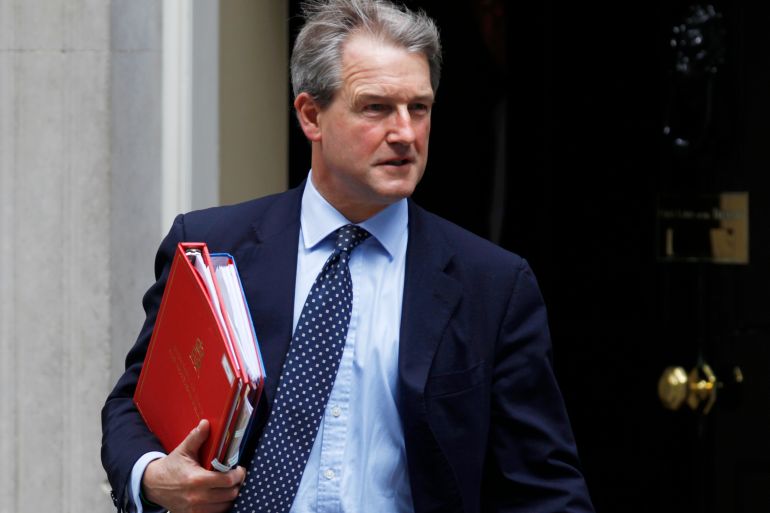Lobbying scandal: UK’s Conservatives accused of corruption
Labour leader says ruling party is ‘wallowing in sleaze’ after it voted to back an MP who used his position to promote companies.

The United Kingdom’s ruling Conservative Party has been accused of corruption after backing a colleague who broke paid lobbying rules.
MPs in the House of Commons voted by 250 to 232 on Wednesday against a 30-day suspension of Owen Paterson, a move that was recommended by the chamber’s standards committee.
Keep reading
list of 4 itemsFrance-UK fishing row: Paris delays sanctions as talks continue
UK police officers admit taking, sharing photos of murder victims
Energy crisis: UK consumers face rising fuel poverty this winter
The watchdog had determined that Paterson committed an “egregious case of paid advocacy” by repeatedly using his position to promote two companies, which together paid him nearly three times his annual parliamentary salary.
But when MPs were asked to endorse his suspension, a group of Conservatives, with Prime Minister Boris Johnson’s support, put forward a proposal to instead delay it and set up a new committee to review the Commons’ disciplinary process.
On Thursday, Johnson’s government announced it was backtracking on its plans to overhaul the system for combating parliamentary corruption after a backlash which included his adviser on ethics calling it a “damaging moment” for democracy.
Opposition parties angered by the proposal said prior to the U-turn that the rules were being changed because the government did not support Paterson’s suspension, a move they said would damage public trust in parliament.
Some MPs shouted “shame” as the result of Wednesday’s vote was read out.
There was also disquiet among some on the governing benches. Of the 361 Conservative MPs in parliament, more than 100 either voted against or abstained.
‘Rot starts at the top’
Labour Party leader Keir Starmer denounced Wednesday’s move by Conservative MPs as “corruption”.
“Tory [Conservative] MPs voted to let off one of their own,” he said in an opinion piece published in the Guardian newspaper, before accusing the party of “wallowing in sleaze”.
Starmer singled out Johnson for particular criticism.
“The rot starts at the top. We have a prime minister whose name is synonymous with sleaze, dodgy deals and hypocrisy,” he said.
Paterson, who has said the stress of the investigation contributed to his wife’s suicide last year, disputes the standards committee’s findings and said witnesses who came forward to support him were not spoken to.
“The process I was subjected to did not comply with natural justice,” he said in a statement. “After two years of hell, I now have the opportunity to clear my name.
“I hope that no other MP will ever again be subject to this shockingly inadequate process.”
Gov’t defends seeking ‘due process’
The current Committee on Standards comprises seven legislators from several parties including four Conservatives, as well as seven lay members.
But the proposed refashioned committee was to be a body with a majority of Conservatives and led by a former Conservative minister. Opposition parties indicated they would boycott it.
The government said on Wednesday it was focused on improving the process of investigating MPs accused of wrongdoing.
But announcing its U-turn on Thursday, Jacob Rees-Mogg, the Leader of the House of Commons who is in charge of organising government business, said although parliament voted to change the system, it could only happen if there was cross-party agreement.
“There is a strong feeling that this should not be based on a single case, or applied retrospectively,” Rees-Mogg said, admitting the vote a day earlier had “conflated” Paterson’s case with plans to overhaul the policing of MP’s conduct.
“We will bring forward more detailed proposals once there have been cross-party discussions,” he added.
Another vote on whether Paterson should be suspended is expected to take place following the government’s reversal.